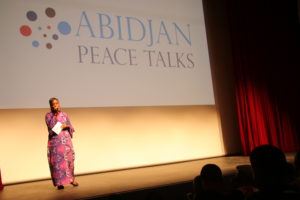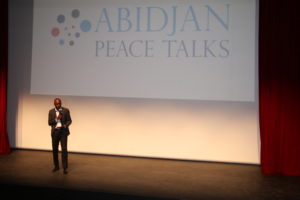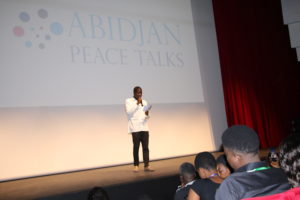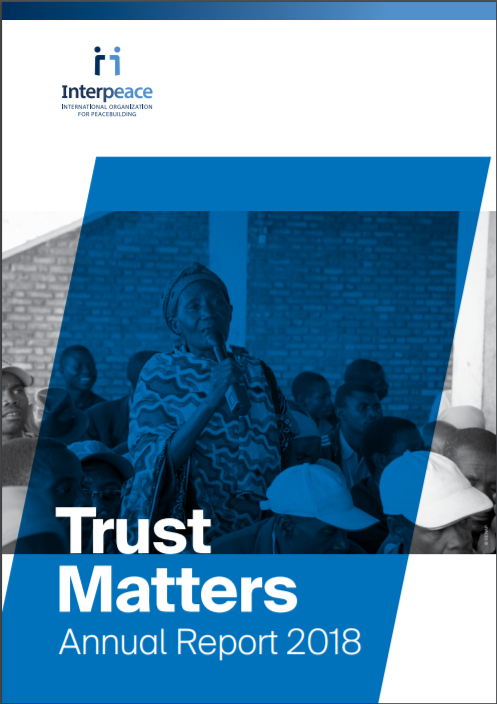Abidjan Peace Talks: Young Ivorians Commit to Sustainable Peace
Le français suit
While only a fraction of young people in Côte d'Ivoire contribute to violence, the common stigma of youth as perpetrators of violence remains a shield to the potential of the majority driving substantial positive change in the country. The Abidjan Peace Talks have recognized youth as key players who can bring positive change and stability to societies in Côte d'Ivoire.
On Friday, 11 October 2019, more than 400 people gathered at the French Institute of Côte d'Ivoire in the main city Abidjan and listened to 10 young peacebuilders share their personal stories and experiences building peace in their communities across the West African state.
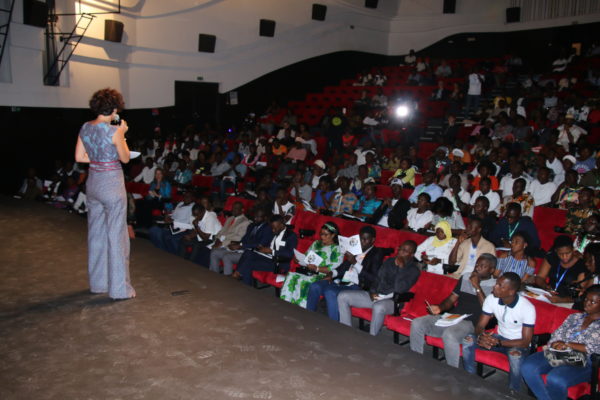
Photo credit: Indigo Côte d’Ivoire
“My participation at Abidjan Peace Talks has comforted me in my convictions to take more action because there is a lot to do to bring about lasting peace in my country,” said one participant, Richmond Koné.
It was the first time that the Peace Talks, a global initiative which builds on the idea that everyone can play a part in building peace, travelled to Côte d'Ivoire and the second time it was hosted in Africa, after the Nairobi Peace Talks in 2015.
Abidjan Peace Talks was part of a three-day public event named “Youth for Peace Côte d'Ivoire” that aimed to create an inclusive platform for young Ivorians to dialogue with decision makers and share innovative ideas that contribute to sustainable peace in the country.
“Youth for Peace re-awakened us on our responsibility in the peace process in Côte d'Ivoire. It gathered Ivorian youths and gave them the floor to speak. We have a lot to say but do not find platforms of this scale to express ourselves. Some of us want to act, but do not know how. The Abidjan Peace Talks and all its inspiring stories, I’m sure, has inspired many youths in one way or the other to act and be useful to our country,” said Michèle Gnokile, one of the speakers of Abidjan Peace Talks.
- Michèle Gnokilé
- Boris Kone
Abidjan Peace Talks held under the message “I build the peace I want for Côte d'Ivoire, and you?”, inspired by the Youth for Peace Côte d'Ivoire theme “Contribution of Youth to Peace in Côte d'Ivoire”
The event was timely as Côte d'Ivoire prepares for elections in 2020, and was jointly organized by N’Zarama Center for Peacebuilding, Indigo Cote d’Ivoire and Interpeace.
Shortly after the Peace Talks on 11 October, the 10 young speakers, who shared their stories about how they contribute to Peace in Côte d'Ivoire, visited the communes of Attecoubé and Abobo in Abidjan to inspire other young people to contribute to peacebuilding in their communities.
The Peace Talks have inspired several young Ivorians who committed to take individual actions for peace in their country, after listening to the inspiring stories of the speakers.
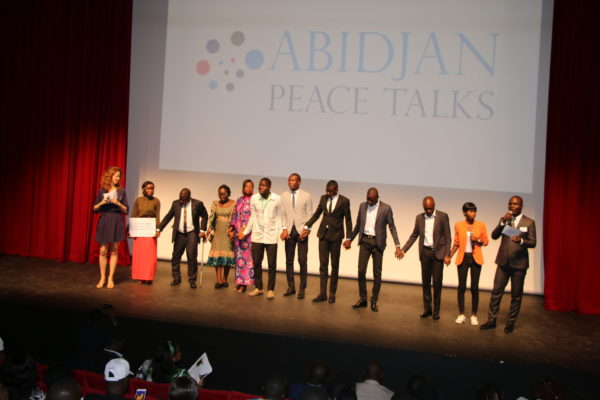
All speakers at the Abidjan Peace Talks. Photo credit: Indigo Côte d’Ivoire
“I feel touched by the story of Issouf Ouattara, when he said no matter how angry one is, he or she should not pick a stone and throw at another person. I felt touched because when we get angry and destroy another person, we destroy ourselves too,” said one young man, after listening to the speakers in Attécoube.
The Abidjan Peace Talks have also inspired Ivorian journalists who now want to produce radio programmes for peacebuilders to share their inspiring stories. The Peace Talks tour continues to other neighbourhoods famous for violent activities in Côte d'Ivoire.
“Abidjan Peace Talks celebrated the personal stories of young Ivorians, both exceptional and ordinary, who show that peace is everyone’s business; that everyone can contribute to peace at his or her own level,” explained Mathilde Boddaert, Interpeace Senior Programme Manager for Côte d'Ivoire.
You can watch the Abidjan Peace Talks videos here in French.
Youth for Peace Côte d'Ivoire was organized by N’Zarama Center for Peacebuilding, Indigo Côte d'Ivoire and Interpeace, with support from the Economic Community of West African States (ECOWAS), the German Agency for International Cooperation (GIZ), the European Union (EU), the African Union (AU), the French Embassy in Côte d'Ivoire, the Swiss Embas/sy in Côte d'Ivoire, the French Institute in Côte d'Ivoire and the United Nations Development Programme (UNDP).
Abidjan Peace Talks: les jeunes Ivoiriens s’engagent pour une paix durable
« J’ai été touché parce que lorsque nous nous mettons en colère et détruisons une autre personne, nous nous détruisons nous-mêmes également ». Cette émotion est celle de l’un des spectateurs des récents Abidjan Peace Talks. La rencontre a permis de mettre en valeur 10 expériences de jeunes Ivoiriens qui tentent au quotidien de contribuer à un changement positif et d’apporter une stabilité dans leur pays. Dans une Côte d’Ivoire qui entre dans une période préélectorale importante et où leurs camarades sont souvent stigmatisés comme attiseurs de violence alors que seule une poignée d’entre eux posent problème.
Plus de 400 personnes se sont rassemblées le 11 octobre dernier à l’Institut français de Côte d’Ivoire dans la capitale économique. Toutes réunies pour écouter les histoires personnelles de ces jeunes qui oeuvrent pour consolider la paix dans leurs communautés. « J’ai été conforté dans mes convictions qu’il faut agir davantage parce qu’il y a beaucoup à faire pour atteindre une paix durable dans mon pays », insiste l’une d’entre elles.

Photo credit: Indigo Côte d’Ivoire
Les Peace Talks, une initiative globale qui s’appuie sur l’idée que chacun peut prendre sa part dans la construction de la paix, ont investi pour la première fois la Côte d’Ivoire. Cette discussion était la seconde seulement en Afrique après celle de Nairobi il y a quatre ans. Elle a été organisée dans le cadre de la rencontre plus large « Les jeunes pour la paix en Côte d’Ivoire », prévue sur trois jours, pour établir une plateforme de dialogue entre jeunes Ivoiriens et décideurs et partager des scénarios innovants qui peuvent contribuer à une paix durable dans ce pays.
Ce format des ‘jeunes pour la paix’ « nous a réveillés sur notre responsabilité. Il a donné la parole aux jeunes Ivoiriens. Nous avons beaucoup à dire mais nous ne trouvons pas de plateforme de cette dimension pour nous exprimer », explique l’une des intervenantes des Peace Talks, Michèle Gnokile. Et « je suis certaine » que les Abidjan Peace Talks « ont inspiré de nombreux jeunes d’une manière ou d’une autre pour qu’ils agissent et qu’ils soient utiles », ajoute-t-elle.
- Michèle Gnokilé
- Honoré Zamblé
Organisés sous le titre “Je construis la paix que je veux en Côte d’Ivoire, et toi ?”, ceux-ci tombaient à point nommé alors que la Côte d’Ivoire se prépare aux élections générales de 2020. La manifestation pour laquelle se sont alliés le Centre N’Zarama pour la consolidation de la paix, Indigo Côte d’Ivoire et Interpeace ne s’est pas contentée de rester confinée à l’Institut français. Les 10 intervenants sont également allés partager leurs expériences dans les quartiers d’Attecoubé et Abobo.
Pari réussi, plusieurs spectateurs en sont ressortis avec une volonté d’action. Parmi les premières conséquences concrètes de cette séquence, des journalistes ivoiriens souhaitent désormais produire des émissions de radio pour que les consolidateurs de paix puissent relayer leurs témoignages. De son côté, la tournée de ces Peace Talks se poursuit dans d’autres quartiers réputés violents en Côte d’Ivoire. « La paix est l’affaire de tous. Chacun peut contribuer”, relève la responsable des projets d’Interpeace dans ce pays Mathilde Boddaert.
Vous pouvez regarder les vidéos d’Abidjan Peace Talks ici en français.

Photo credit: Indigo Côte d’Ivoire
Youth for Peace Côte d'Ivoire était organisé par le Centre N’Zarama pour la consolidation de la paix, Indigo Côte d’Ivoire et Interpeace avec le soutien de la Communauté économique des Etats d’Afrique de l’Ouest (CEDEAO), l’Agence allemande pour la coopération internationale (GIZ), l’Union européenne (UE), l’Union africaine (UA), l'ambassade de Suisse en Côte d'Ivoire, l’ambassade de France en Côte d’Ivoire, l’Institut français en Côte d’Ivoire et le Programme des Nations Unis pour le développement (PNUD).
